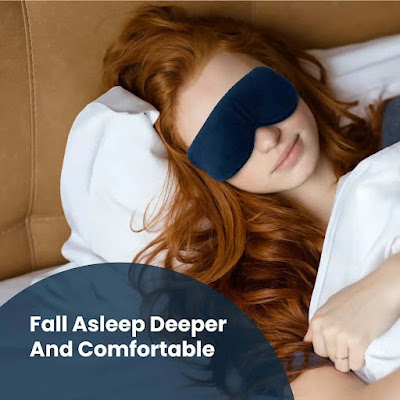The Ultimate Guide to Sleep Masks: Benefits, Types, and Tips for Better Sleep
Introduction
Have you ever struggled to fall asleep because of glaring
streetlights or the morning sun streaming through your windows? Enter the sleep
mask—a small but mighty tool that can revolutionize your sleep experience.
Sleep masks are more than just a fancy accessory; they’re a practical solution
for anyone seeking better sleep in a light-filled environment.
But what makes sleep masks so effective, and how can you
choose the best one? Let’s dive in.
 |
| Sleep masks |
Benefits of Using a Sleep Mask
Enhances Sleep Quality
Sleep masks help create an environment conducive to restful
sleep. By blocking out light, they encourage deeper and uninterrupted sleep
cycles.
Blocks Out Light
Artificial light exposure can mess with your sleep. A sleep mask ensures
darkness, even in bright conditions, so your brain knows it’s time to rest.
Supports Natural Circadian Rhythm
Light influences your body’s internal clock. By keeping your
surroundings dark, sleep masks help maintain your natural sleep-wake cycle.
Relieves Stress and Improves Relaxation
Many people find the gentle pressure of a sleep mask
soothing, reducing stress levels and promoting relaxation before bed.
Different Types of Sleep Masks
Fabric Sleep Masks
·
Silk Sleep Masks
Silk masks are gentle on the skin, reducing friction and
preventing wrinkles.
·
Cotton Sleep Masks
These are breathable and ideal for those with sensitive
skin.
Gel Sleep Masks
Often used for soothing tired eyes, gel masks can be chilled
for a refreshing feel.
Weighted Sleep Masks
These masks use gentle pressure to relieve stress and
promote relaxation.
Heated Sleep Masks
Perfect for cold nights or relieving sinus pressure, heated
masks provide therapeutic warmth.
Contoured Sleep Masks
With a molded design, these masks don’t press on your
eyelids, making them great for light sleepers.
How to Choose the Right Sleep Mask
Material Matters
Opt for materials like silk or cotton for breathability and
comfort.
Comfort and Fit
Ensure the mask fits snugly but doesn’t press too hard on
your face.
Additional Features
Look for masks with adjustable straps, cooling properties,
or weighted designs to suit your needs.
Tips for Maximizing the Benefits of a Sleep Mask
·
Pair with a Relaxing Bedtime Routine
Combine your sleep mask with calming activities like reading
or meditation.
·
Maintain Cleanliness
Wash your sleep mask regularly to keep it fresh and
hygienic.
·
Combine with Earplugs or White Noise
For a truly restful experience, block out noise along with
light.
Common Misconceptions About Sleep Masks
·
Do sleep masks harm the skin?
High-quality masks are safe and can even help reduce
wrinkles if made of silk.
·
Are sleep masks only for travel?
Not at all! Sleep masks are just as beneficial at home.
Who Can Benefit Most from Sleep Masks?
·
Night Shift Workers
Create a nighttime environment during the day.
·
Frequent Travelers
Beat jet lag by adapting to new time zones.
·
Light Sleepers
Block out every hint of light for deeper sleep.
How to Properly Use a Sleep Mask
·
Adjust the strap to a comfortable tension.
·
Position the mask securely over your eyes.
·
Relax and enjoy uninterrupted sleep!
Potential Drawbacks of Using a Sleep Mask
·
Skin Irritation
Low-quality materials can cause irritation—choose
skin-friendly fabrics.
·
Improper Use Leading to Discomfort
Ensure a proper fit to avoid headaches or discomfort.
Conclusion
A good sleep mask is more than just a convenience—it’s a
game-changer for anyone looking to improve their sleep quality. Whether you’re
at home or traveling, a well-chosen sleep mask can help you drift off into
blissful rest.
FAQs
Are sleep masks safe for daily use?
Yes, with proper hygiene and quality materials, they’re
perfectly safe.
How often should I wash my sleep mask?
Ideally, wash it once a week or more if it’s exposed to
sweat or makeup.
Can children use sleep masks?
Yes, but ensure they’re age-appropriate and comfortable.
Do sleep masks help with insomnia?
They can aid relaxation and block distractions, potentially
improving sleep for those with insomnia.
Are there alternatives to sleep masks?
Blackout curtains or eye pillows can also help create a dark
sleep environment.
.jpg)


Comments
Post a Comment